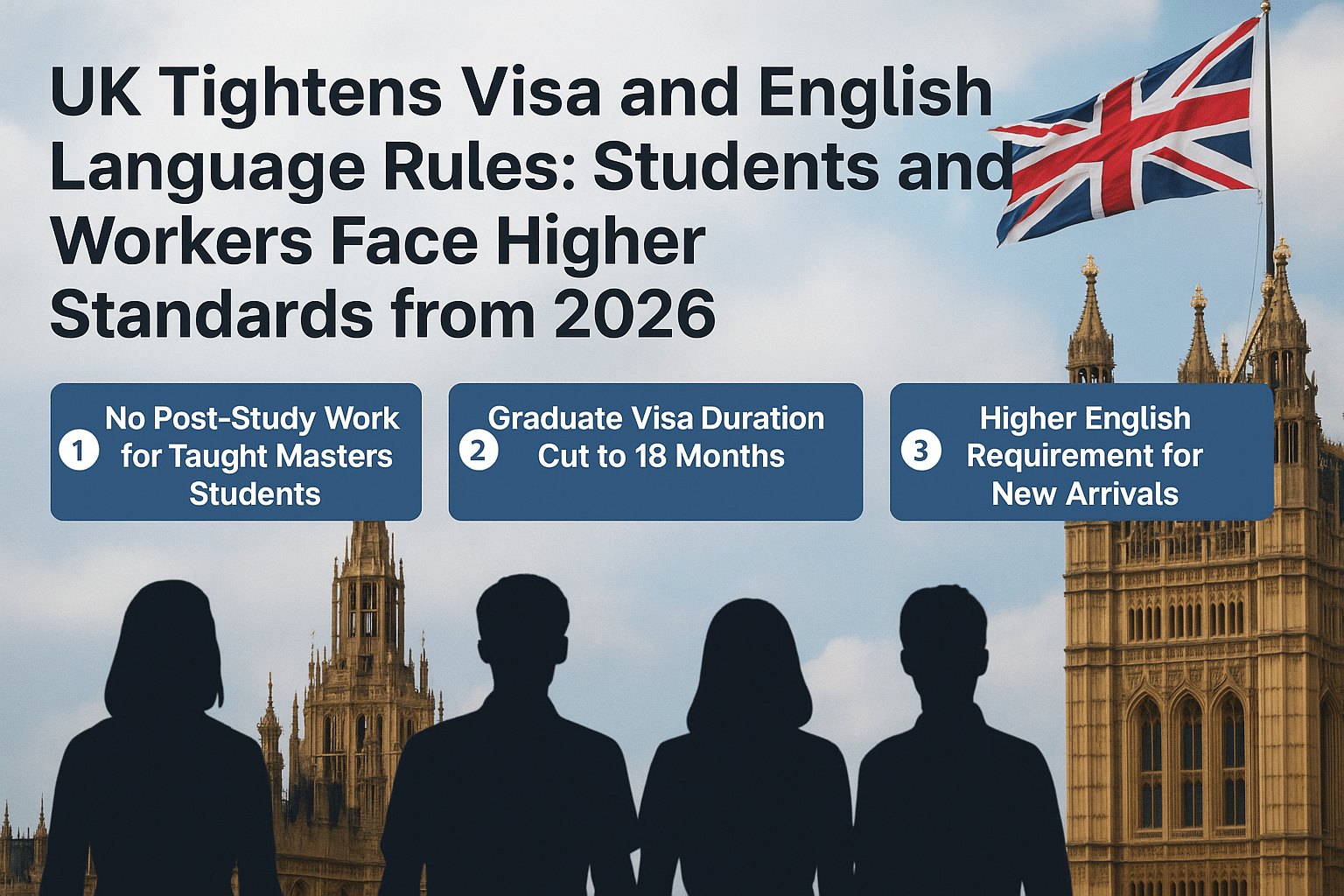Jasmine Grover Content Strategy Manager
Content Strategy Manager | Updated On - Oct 16, 2025
The UK government has announced an overhaul of its visa system, introducing tougher English language tests, shorter post-study work periods, and higher financial requirements for international students and skilled workers. The changes, effective from 2026, are part of the government’s strategy to curb immigration and strengthen integration.
Check: Russell Group Universities UK
Major Changes at a Glance
| Change | Effective Date | Details |
|---|---|---|
| Secure English Language Test (SELT) | Jan 8, 2026 | Mandatory for skilled workers; B2 level (A-Level equivalent) required |
| Graduate Route Visa Duration | Jan 1, 2027 | Reduced from 2 years to 18 months; PhD graduates retain 3 years |
| Student Maintenance Funds | Nov 2025 | Increased to £1,529/month (London) and £1,171 elsewhere |
| Immigration Skills Charge (ISC) | 2026 | Increased by 32% for sponsoring employers |
| High Potential Individual (HPI) Route | 2026 | Expanded to double the number of eligible universities; capped at 8,000 annual visas |

Graduate Route Cut to 18 Months
From January 2027, international students graduating from UK universities will have 18 months to secure employment under the Graduate Route Visa, reduced from the current two years. PhD graduates will continue to receive a three-year post-study stay.
Officials argue the decision is backed by data showing too few graduates transition into graduate-level jobs.
However, education experts warn this could discourage foreign enrolments, particularly from India, which sent nearly 99,000 students to the UK in 2024 — one of the largest international cohorts.
Also Read:
- Japan Eyes 15,000 Indian Students in 5 Years, Promotes Scholarships, English-Taught Programs, and Industry Links
- New Zealand Emerges as a Top Study Destination for Indian Students
- US Sees 19% Drop in International Student Arrivals in August 2025 Amid Stricter Visa Rules
- France Sees 17% Rise in Indian Students, Aims for 30,000 by 2030
Higher Living Cost Proof for Students
Financial proof requirements will also rise for the next academic year. Students must now show they can afford £1,529 per month in London and £1,171 elsewhere — an increase of 3%–4% from previous levels.
This aims to ensure international students can manage rising living costs amid the UK’s ongoing inflation concerns.
Check: Financial Requirements for UK Student Visa
New English Language Requirements for Skilled Workers in 2026
Starting January 8, 2026, all skilled workers, scale-up visa holders, and applicants under the High Potential Individual (HPI) route must clear a Secure English Language Test (SELT) with a B2-level proficiency—equivalent to A-Level or Class 12 in India.
The test will be administered by Home Office-approved providers such as IELTS SELT Consortium, Pearson, PSI Services, or LanguageCert.
UK Home Secretary Shabana Mahmood stated that the reform ensures migrants can “fully contribute to national life.”
“If you come to this country, you must learn our language and play your part,” she said.
The Home Office estimates the new language requirement will help migrants integrate more easily into workplaces and communities, especially in middle-skilled sectors.
Employer Costs and Skilled Worker Fees Rise
Employers sponsoring foreign workers will now pay 32% more under the Immigration Skills Charge (ISC).
- Small or charitable organizations: £480 per worker per year (up from £364)
- Medium and large employers: £1,320 per year (up from £1,000)
The UK government says the increase will “boost investment in British talent” and reduce dependency on foreign labour.
Expanding High-Potential and Talent Routes
The government will double the number of global universities eligible under the High Potential Individual (HPI) route, raising total annual applications from 4,000 to 8,000. This visa is designed to attract graduates from top-ranked international universities who wish to work or establish careers in the UK.
Additionally, the Innovator Founder and Global Talent routes will expand in 2026, focusing on researchers, creatives, and entrepreneurs in high-growth industries such as film, AI, and design.
Impact on Indian Students
India remains the second-largest source of international students in the UK.
While the new rules won’t restrict enrolment directly, the higher financial threshold and shorter post-study work period could affect affordability and career planning for middle-income families.
Industry experts suggest Indian students may increasingly compare the UK with Canada, Ireland, and Germany, where post-study stays remain longer.
Government Outlook
The UK’s Labour government, led by Prime Minister Keir Starmer, has emphasized that the reforms are not about deterring international talent but “rebalancing” immigration to align with the economy’s needs.
The Home Office expects the measures to reduce net migration by up to 100,000 people annually while keeping pathways open for high-skilled professionals and researchers.
The 2026–27 reforms represent one of the most significant overhauls of the UK’s visa framework in a decade.
For Indian students and skilled professionals, the new system introduces higher language standards, stricter financial checks, and shorter work timelines, but also expanded routes for top talent and entrepreneurs.
As the global competition for skilled migration intensifies, these changes are likely to reshape how Indian students approach studying — and working — in the UK.



Comments